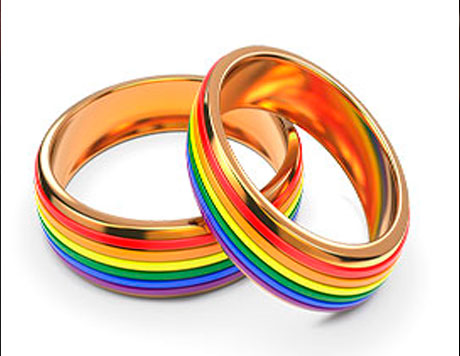According to a recent study by the Pew Forum (April 4, 2015), sixty percent of American Catholics support gay marriage--quite in defiance of the United States Conference of Catholic Bishops. That's more than the average of all Americans: only 57 percent of all Americans support gay marriage. Catholic support for gay marriage is almost as high as mainline Protestant support, which polls in at sixty-two percent. Both Catholics and mainline Protestants support marriage in far higher numbers than what one finds among, say, white evangelicals, among whom only 28% support gay marriage. Hispanic Catholics are more likely to support gay marriage than Hispanic Protestants.
Outsiders to Catholicism might be puzzled: how can a church with an officially infallible pope and sharply authoritarian bishops nonetheless house such sturdy dissent? There's other evidence of dissent in the ranks, of course, like the fact that 98% of Catholic women between 15 and 44 who have had sex at all use or have used birth control. That finding has been scrutinized six ways from Sunday by the Pulitizer-Prize winning Politifact.com. The claim hold up.
From a longer historical perspective, Catholic dissent from absolutist church teachings should not surprise anyone. In the 1200s, Thomas Aquinas, arguably the pre-eminent medieval Scholastic theologian, argued decisively that the only unequivocal moral wrong is to disobey your own conscience. Pope Francis was channeling Aquinas in his letter to an Italian journalist who asked if non-believers would go to hell. Francis replied that nonbelievers are also bound by their own conscience. They must do what they see as right. The Nuremburg tribunals after World War II also echoed Aquinas when they said that "following orders" is no excuse: all of us are bound to obey our own conscience, no matter what authorities might tell us to do--like abandoning our gay children, or refusing to recognize gay marriages in our communities.
Classic teachings on conscience are not an invitation to moral chaos because the teaching come with a footnote: one's conscience must be "well-formed." That is, the pedophile or the suicide bomber cannot plead that they are innocent because they thought they were morally correct in what they did.
Conservative bishops will claim that the test of the well-formed conscience is abject conformity to infallible church teachings. But infallibility claims are just as shabby as claims about the literal inerrancy of the Bible. Both claims are nonsense—nonsense logically, nonsense theologically. The more rigorous test of conscience is a complex, rational examination of honest evidence on all sides of any contested issue, an analysis framed by the primary moral injunction to honor "the image of God" in every person. In practical terms that means behave with compassion. Seek justice and love kindness. Welcome the outsider, the outcast, and the oppressed.
When bishops say "obey, don't think," they are running afoul of Catholic tradition itself. This tradition includes thousands of years of rigorous moral thinking on difficult ethical issues. When a majority of card-carrying Catholics refuse to surrender their own conscience—whether that's the 60% of Catholics who support gay marriage or the 98% of sexually-active Catholic women who use birth control—secular progressives need to realize that Christian fundamentalism is vigorously opposed from within Christianity.
And the best way to stop Christian fundamentalism is from the inside. But for this to happen, secular humanists and Christian humanists need to stand together. We share a distinctive commitment to the humane as a moral standard and critical thinking as an intellectual standard.
Christianity itself is not the problem. The problem today is a radical, hard-Right fringe that is trying to misappropriate Christian symbolism and cultural capital in pursuing an agenda that has no basis in what Jesus taught.
Sources:
I discuss conscience as a creative process in Confronting Religious Judgmentalism: Christian Humanism and the Moral Imagination, chapter 12. It will be published by Wipf & Stock Press in 2016. Details are on my homepage at CatherineMWallace.com
I lay out the flawed reasoning and cultural backstory of religious opposition to gay marriage in Confronting Religious Opposition to Gay Marriage: Christian Humanism and the Moral Imagination, due out from Wipf & Stock Press in November, 2015.
Religious support for gay marriage organized by religious affiliation: http://www.pewforum.org/2015/07/29/graphics-slideshow-changing-attitudes-on-gay-marriage
Catholic women and birth control: http://www.politifact.com/truth-o-meter/article/2012/feb/17/keeping-facts-straight-98-catholic-women/
Pope Francis on atheists following their own conscience: https://w2.vatican.va/content/francesco/en/letters/2013/documents/papa-francesco_20130911_eugenio-scalfari.html and, in a follow-up, http://www.repubblica.it/cultura/2013/10/01/news/pope_s_conversation_with_scalfari_english-67643118/?refresh_ce

- support
- Blog
Catholics follow ancient Christian tradition in supporting gay marriage—despite what bishops say.
- support
- Blog
